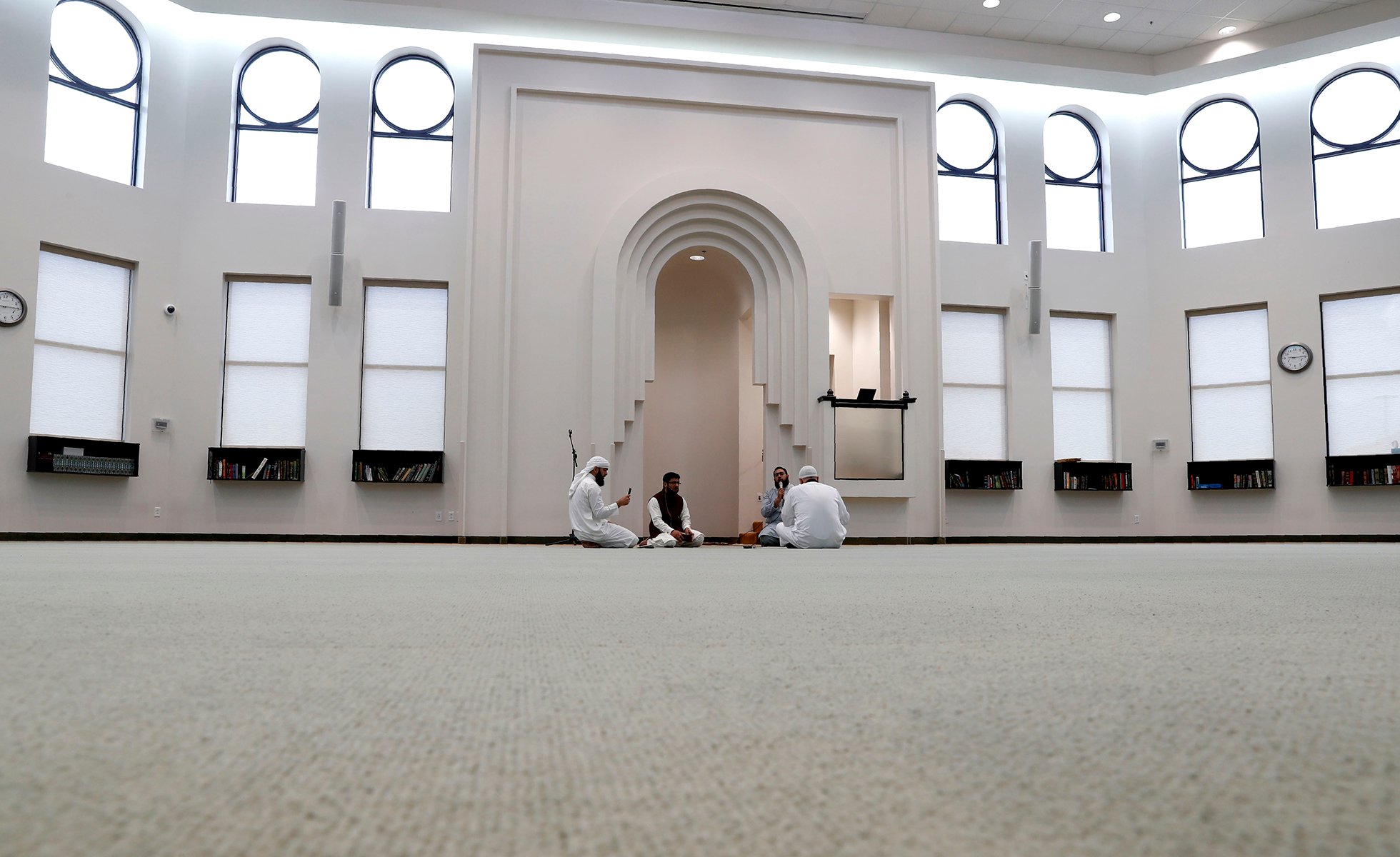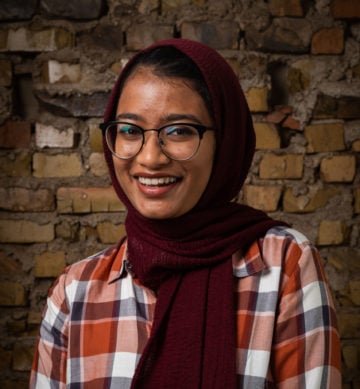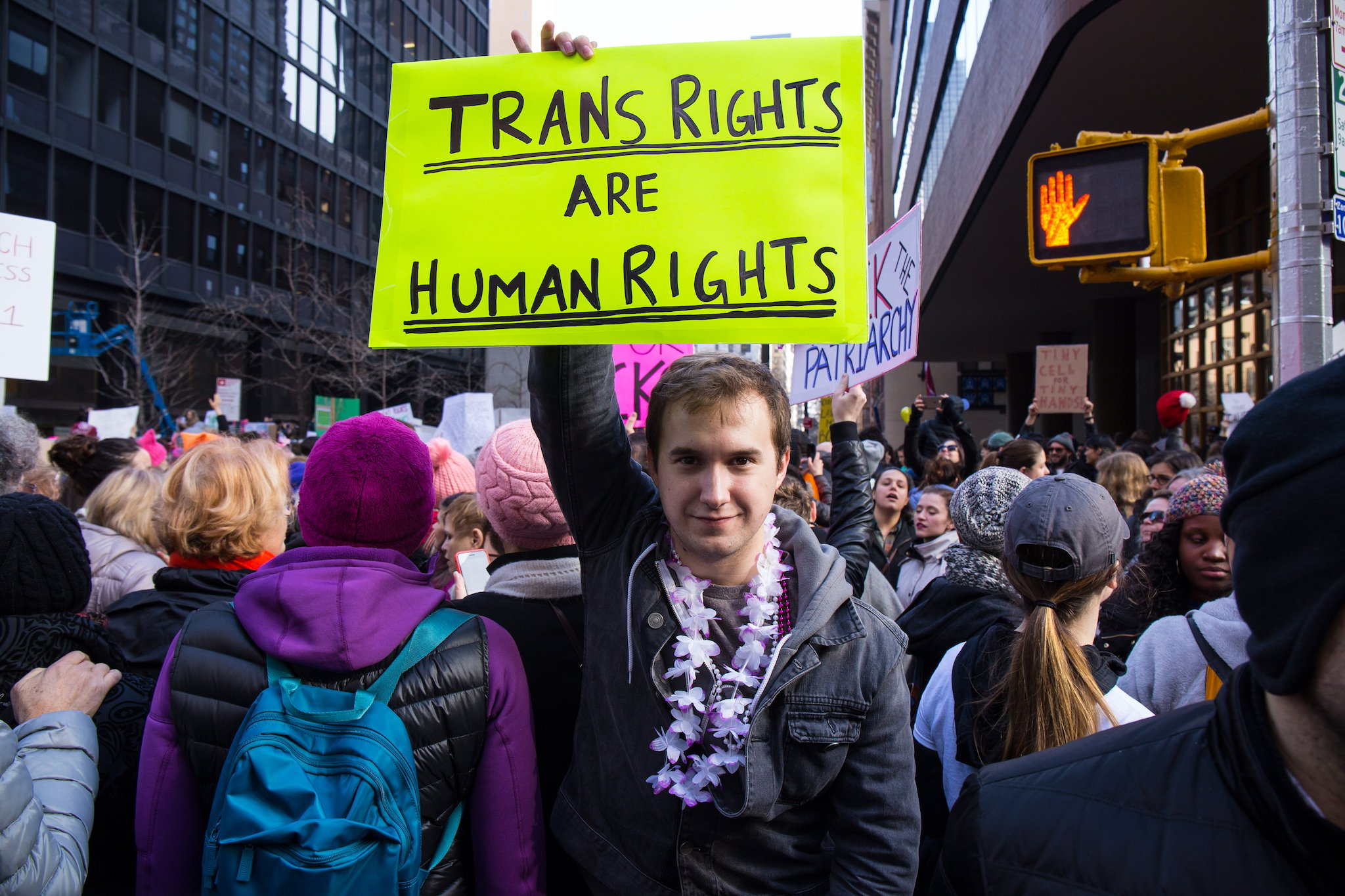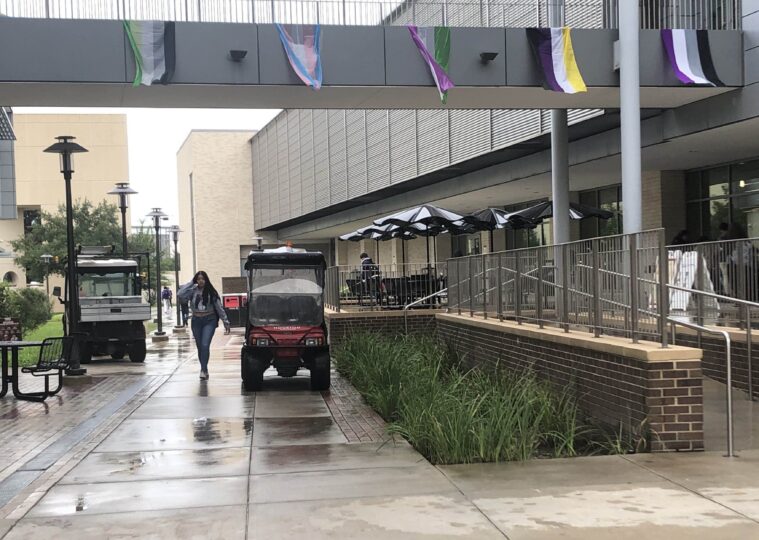Muslim Activists Say It’s Time to Join Black Lives Matter Calls to Reform Law Enforcement
A Dallas mosque’s decision to partner with law enforcement during a nationwide reckoning on the role of policing fits into a broader hesitation from Muslim communities to jeopardize relationships with police departments.

By Amal Ahmed
July 24, 2020
In mid-June, the East Plano Islamic Center went viral. The mosque’s resident scholar, Dr. Yasir Qadhi, a prominent and popular Muslim American preacher whose online lectures regularly draw tens of thousands of views, announced his next lecture: Systemic Racism—An Open Discussion about Policing Policies with Plano Police Chief. Muslim Americans from across the country quickly called on Qadhi to cancel the virtual talk, saying that the event amplified police narratives at the expense of Black organizers working to end racialized police violence.
The decision of the East Plano Islamic Center (EPIC) to partner with law enforcement was not unusual: Muslim communities face frequent Islamophobic threats and are hesitant to jeopardize their relationships with law enforcement. As well, cooperation with authorities often reinforces ideas of Muslims as ideal citizens. But with Black Lives Matter protestors and supporters calling for reforms, including the outright abolition of police departments nationwide, EPIC suddenly found itself on the same stage as other cultural and corporate establishments, publicly grappling with questions of systemic racism and equity. (EPIC did not respond to multiple requests for comment.)
Black Muslims make up a majority of Muslims in America, yet mosques are deeply segregated by race and class, reflecting a decades-long trend of upwardly mobile immigrant families flocking to affluent, white suburbs. Today, predominantly African American mosques exist in silos, far from largely Arab American and South Asian American congregations like EPIC.
“There are two versions of American Islam. There are wealthy, suburban mega-mosques, and there are inner city masjids. Those two have yet to converge,” says Dr. Khalil Abdur-Rashid, an instructor and chaplain at Harvard University. Until a few years ago, he served as the resident scholar at the Islamic Association of Collin County in Plano, and was one of a few Black scholars in positions of leadership. Abdur-Rashid says in his experience, many non-Black imams have no idea how Black people encounter police, or the racist history of policing in the United States—a knowledge gap that has deepened divisions among the faithful.
As backlash to EPIC’s event grew online, the mosque contacted Imam Khalid Shahid, of Masjid al-Islam, a mostly-Black mosque in South Dallas, and asked him to respond to the petition’s demands. Shahid agreed by giving an additional online talk. “The enemy is bigger than the police,” he said in his video, pointing to the murder of Ahmaud Arbery, who was jogging when we was shot and killed by white neighbors, not cops, in Georgia earlier this year. “I’m not saying the police are perfect,” he added. “White supremacy is the enemy. It’s everywhere. It’s within all institutions in America.”
***
Long before the terrorist attacks of 9/11, Muslim Americans have been targeted and surveilled by law enforcement. Black Muslims have been viewed as a domestic threat since the early 20th century, and in the 1940’s, the FBI listed The Moorish Science Temple, a religious sect founded by Drew Ali with chapters in Texas, as an “extremist Muslim group” with suspected ties and sympathies to Japan that could undermine the U.S. government despite its modest size. The government compiled thousands of pages of documents, eventually finding no proof that the religious group was spreading pro-Japanese propaganda during World War II.
In the 1960s, the FBI ramped up surveillance and infiltrated Black civil rights groups and organizations across the political spectrum. The surveillance program, known as the Counterintelligence Program, or COINTELPRO, was created to suppress a range of political dissent from “black extremists” and socialists, to the American Indian Movement and the Puerto Rican independence movement. Mosques, churches, community centers, and even Black-owned bookstores were surveilled through the project. “The root of this program is in the racist idea that Black people and Muslims are radical, and that they are dangerous when they are organizing,” says Fatema Ahmad, the executive director of the Muslim Justice League. “[Authorities] suppress community organizing.”
Though COINTELPRO officially ended in 1971 after program documents were leaked, domestic surveillance programs targeting people of color continued to shape shift through the Cold War. But in 2001, the War on Terror cemented many of these programs as essential to national security. A new agency, the Department of Homeland Security (DHS) was created specifically for the task. Congress vastly expanded the government’s ability to spy on its citizens—particularly in mosques and Muslim communities established in major American cities.
In 2016, DHS launched the newest iteration of these programs: Countering Violent Extremism (CVE). Local police departments, as well as other local entities including nonprofits and schools, could apply for grants to create programming to counter potential “radicalization” among “at-risk” individuals within a community. Nearly 25 percent of the grant’s $10 million total was doled out to law enforcement agencies directly, but CVE programs led by social service agencies also cooperated with local police.
Internet curriculum developed by those agencies for CVE educates young Muslims on how terrorist groups might “make contact” through chat forums or blog posts, while the FBI’s online interactive lesson, also developed for CVE, called “Don’t be a Puppet” focuses on international terrorism recruitment. In 2018, the Brennan Center for Justice, a non-partisan law and public policy institute at New York University, found that the vast majority of CVE programs targeted minority groups: Muslims, Black Lives Matter activists, refugees, and LGBTQ groups. Brennan also found that little attention was paid to white supremacist organizations and terror groups despite years of mounting evidence that online platforms like YouTube, Facebook, and Twitter aided in the radicalization of young white men.
“There are two versions of American Islam. There are wealthy, suburban mega-mosques, and there are inner city masjids. Those two have yet to converge.”
CVE programs are sometimes developed with the cooperation or tacit agreement of institutions like mosques. According to the Brennan Center, CVE can “co-opt community leaders to promote government messages.” Though DHS says that CVE does not include intelligence gathering operations, critics have often found the opposite to be true. At the very least, the program starts with an assumption that violent extremism is hidden in plain sight in Muslim communities, critics like Ahmad say.
Today, programs that bring law enforcement into mosques have done away with the pretense of covertness, Fatema Ahmad says. Indeed, they no longer need to remain inconspicuous if mosques welcome law enforcement with open arms in an attempt to prove their communities have nothing to hide. “CVE deputizes people to surveil each other: Good Muslims look for Bad Muslims,” Ahmad says. “Muslims are great, as long as they are reporting each other.”
Both of the CVE grants awarded in Texas, in Houston and Arlington, were specifically aimed at Muslim communities. In 2017, the Arlington Police Department received more than $45,000 to develop Project Connect. Paul Rodriguez, an officer who led the program, describes it as a community engagement program to educate the city’s immigrant Muslim community about the police department as one of many city services available to them. But in a memo, the Department of Homeland Security summarized the program differently, saying it would “focus on ISIS, Al-Shabab, and other Islamist terorrist movements most often targeting American Muslim youth.” Those two goals aren’t actually at odds: A report from Duke University’s Triangle Center on Terrorism and Homeland Security recommends community outreach as a “promising practice” that doesn’t run afoul of civil rights law. The goal is that participants will steer themselves away from certain groups or behaviors, or feel comfortable reporting people who don’t.
Both Rodriguez and Gamal Abdel Hafiz, a former FBI agent turned consultant to help develop Arlington’s program, say that the program had almost to nothing to do with terrorism. “We didn’t solicit information on violent extremism,” Rodriguez says. “Through this program, we not only introduced ourselves, but we also created a connection if there was a concern about anyone with bad intentions.”
“If you have a good relationship [with law enforcement], you will have fewer problems. You can avoid violent extremism,” Abdel Hafiz says. He acknowledges that nationally, the CVE program has developed a flawed reputation, but insists those problems—targeting Muslims, increased surveillance—don’t exist in Arlington. “The Arlington police department is one of the best,” he says. “It’s an excellent example.” Abdel Hafiz declined to share materials developed for the program, citing copyright concerns while the Arlington police department stated that they had not retained them in response to a public records request.
Since January, the Council on American Islamic Relations’ Dallas-Fort Worth chapter (CAIR-DFW) has received more than two dozen calls from community members who say that the FBI attempted to question or interview them during an unannounced home visit. Those reports are likely an undercount, according to Syed. Most people who contact CAIR do so after they’ve agreed to let a law enforcement agent into their house, or talked to them voluntarily without an attorney present. In one recent case, Syed says, a client was approached at the parking lot of his workplace by an FBI agent, which employs several Muslims, and told that if he informed law enforcement of any suspicious activity, they could help speed up his wife’s green card application.
Despite decades of targeted and often undue surveillance, abandoning relationships with law enforcement is no easy task. Some communities have seen armed, anti-Muslim protestors standing outside of their mosques, and CAIR’s data shows that hundreds of cases of vandalism occur across the nation every year, meaning Muslim communities have to rely on police to stay safe. That doesn’t leave much room to criticize police brutality.
During EPIC’s event with the Plano police chief, the moderators took pains to remind the chief that they weren’t interrogating him. One prefaced a question about the legality of tear gassing protests by saying, “We’re grateful this hasn’t happened in Plano, under your watch.” Just a few days earlier, half an hour’s drive south from the mosque, Dallas police officers had trapped Black Lives Matter protesters on a bridge past curfew, then launched smoke canisters and flash bangs into the crowd.
The conversations around the EPIC event have also brought anti-Blackness within the Muslim community to the forefront. If EPIC had reached out to Black community leaders before announcing their event with the police chief, they may not have found much support for it, says Kenyatta Bakeer, a senior trainer at the Muslim Anti-Racism Collaborative (ARC). For the past few years, the national organization has provided anti-racist training, including curriculum on “intra-Muslim racism” to local mosques. In the weeks after the Black Lives Matter protests started in late May, Bakeer says Muslim ARC saw its bookings triple, and the petition against EPIC’s talk with the police chief also demanded that mosque leadership participate in Muslim ARC’s training. “It’s not enough to say ‘Black Lives Matter’ and not take a stand. The sentiment is finally shifting,” Bakeer says, particularly among a younger generation of Muslims.
Rejecting police presence at mosques—whether as a security measure or as invited guests—is a recognition of the fact that law enforcement’s fixation on Muslim communities is inseparable from its often violent overpolicing of Black communities. CVE wouldn’t be possible without COINTELPRO.
“We have an interesting sense of justice, kindness, and peace,” says Sara Bawany, a local community organizer from Plano. From a religious perspective, dialogue has always been valued as a way of addressing injustice—it’s part of the legacy of the Prophet Muhammad. “But we forget that the Prophet was also very firm about injustice in his community. You can’t change an inherently racist institution by having tea with them.”
Disclaimer: Amal Ahmed was an intern for CAIR-Chicago in 2017.
Editor’s note: Due to an editing error, an earlier version of this post did not mention that EPIC did not respond to requests for comment. This post has been updated.
Read more from the Observer:
Back to the Wall: A border wall is headed for Laredo—unless opponents can run out the clock.
Andrea Roberts Is Working to Define What Free Black Space Is: Through the Texas Freedom Colonies Project, researchers are working to liberate data on behalf of Black Texans.
In ‘Crooked Hallelujah,’ Kelli Jo Ford Explores How Pain is Passed Down Through Families: Ford’s debut follows the lives of a mother and daughter who move from Oklahoma to North Texas.



